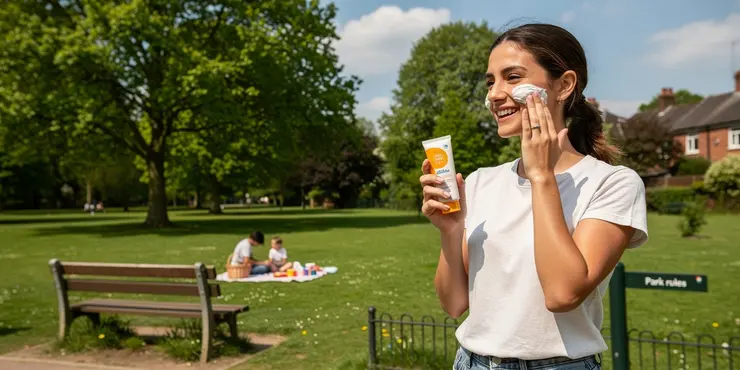
Find Help
More Items From Ergsy search
-

Should I use a different SPF for my face and body?
Relevance: 100%
-

How does sunscreen with SPF 20 compare to SPF 50?
Relevance: 54%
-

What does SPF stand for?
Relevance: 52%
-

Is a higher SPF always better?
Relevance: 51%
-

Do I need a different SPF for water-related activities?
Relevance: 51%
-

What SPF should I use if I am going to be outdoors all day?
Relevance: 50%
-

Can makeup with SPF replace sunscreen?
Relevance: 49%
-

What SPF level is recommended to prevent sunburn?
Relevance: 48%
-

What SPF should I use if I have sensitive skin?
Relevance: 44%
-

What SPF is best for children?
Relevance: 36%
-

Is SPF 15 enough for everyday use?
Relevance: 34%
-

Which factor sunscreen should I use?
Relevance: 32%
-

Are AI body scans reliable?
Relevance: 30%
-
Is salt necessary for the body?
Relevance: 29%
-

Can impetigo spread to other parts of my body?
Relevance: 28%
-

What can I do if I face discrimination as a gig worker?
Relevance: 28%
-

What challenges do water companies face in maintaining infrastructure?
Relevance: 28%
-

How to apply wet wrap bandaging to the head and face area.
Relevance: 27%
-

Are there regulations on transporting the body before the funeral?
Relevance: 27%
-

Greenwashing Lawsuits Increase as Environmental Claims Face Legal Checks
Relevance: 26%
-

How does cortisol affect the body's stress response?
Relevance: 26%
-

Is it legal for my neighbor to have a security camera facing my property?
Relevance: 26%
-
How does the body process salt?
Relevance: 26%
-

What role do regulatory bodies play in fee transparency?
Relevance: 25%
-

Where is GLP-1 produced in the body?
Relevance: 25%
-
What are the common challenges faced by primary care support workers?
Relevance: 25%
-
Does the body store all the fat I consume?
Relevance: 25%
-

Government Faces Backlash Over Welfare System Access Delays
Relevance: 25%
-
What is body dysmorphia and how is it related to eating disorders?
Relevance: 24%
-

UK's Elderly Population Faces Growing Loneliness Crisis
Relevance: 24%
-

How is cortisol regulated in the body?
Relevance: 24%
-

Does tanning lotion prevent sunburn?
Relevance: 24%
-

What role does cortisol play in the body?
Relevance: 23%
-

Steps to Take When Facing Domestic Abuse
Relevance: 23%
-

Can bowel cancer spread to other parts of the body?
Relevance: 22%
-

How does motor neurone disease affect the body?
Relevance: 22%
-

Can testicular cancer spread to other parts of the body?
Relevance: 22%
-

What SPF is recommended for fair skin?
Relevance: 22%
-

What effects do spiking drugs have on the body?
Relevance: 22%
-

Can Botox spread to other parts of the body?
Relevance: 22%
Understanding SPF and Its Importance
Sun Protection Factor, commonly referred to as SPF, is crucial for protecting your skin from the harmful effects of ultraviolet (UV) rays. It measures the level of protection a sunscreen offers against UVB rays, which are mainly responsible for sunburns and contribute to skin cancer. Regardless of whether you're in the UK with its often overcast skies, using a daily SPF is vital since UV rays can penetrate clouds and still cause skin damage.
Differences Between Facial and Body Sunscreen
The skin on your face is generally more sensitive and different in texture compared to the rest of your body. Facial sunscreens are typically designed to be lighter and more compatible with the delicate nature of facial skin. They often contain added ingredients like antioxidants and moisturizers to address specific skin concerns such as acne, sensitivity, or aging. In contrast, body sunscreens are formulated to cover larger areas and might be thicker or more emollient to provide substantial coverage and hydration.
Should You Use Different SPFs for Face and Body?
When considering SPF usage, you might wonder if you need separate products for your face and body. While it's possible to use the same SPF for both areas, there are reasons why you might consider different products. Facial sunscreens often have a higher SPF rating, recommended to be at least 30, to give extra protection to skin that is frequently exposed to the sun. Moreover, facial sunscreens may provide specific benefits such as oil control or anti-aging properties, which body sunscreens lack.
Body sunscreens are generally less expensive by volume, making them a cost-effective choice for covering large areas. However, they might not always be suitable for the face, particularly if you have sensitive skin or are prone to breakouts. The thicker formulation could clog pores or leave a residue that causes discomfort on the more delicate facial skin.
Choosing the Right Sunscreen
When selecting sunscreens, consider your specific skin needs and lifestyle. If you spend a lot of time outdoors or have sensitive skin, investing in a higher SPF facial sunscreen could be beneficial. Mineral-based sunscreens containing zinc oxide or titanium dioxide are often recommended for sensitive skin as they are less likely to cause irritation.
For everyday use on the body, a broad-spectrum SPF 30 sunscreen is generally adequate. Ensure that the product is water-resistant if you expect to be swimming or sweating. Ultimately, the best sunscreen is one that you are willing to apply regularly and in sufficient amounts.
Conclusion
While it might seem simpler to use the same sunscreen for both face and body, there are distinct advantages to using separate products tailored for each area. Facial sunscreens offer specialized formulas suited for your skin’s particular needs, while body sunscreens provide economical coverage. Choosing the right products can help ensure that you're adequately protected from UV damage all year round, regardless of the notoriously changeable UK weather.
Understanding SPF and Its Importance
SPF stands for Sun Protection Factor. It helps protect your skin from the sun's harmful rays. These rays are called UV rays, and they can cause sunburns and skin cancer. Even if it's cloudy, UV rays can still harm your skin. So, using sunscreen every day is important, even in places like the UK where it might be cloudy often.
Differences Between Facial and Body Sunscreen
The skin on your face is different from the skin on your body. It's more sensitive and delicate. Facial sunscreens are made to be gentle and light. They often have extra things in them to help with acne, sensitive skin, or signs of aging. On the other hand, body sunscreens are made to cover larger areas of your body. They can be thicker and help keep your skin moist.
Should You Use Different SPFs for Face and Body?
You might wonder if you need two different sunscreens for your face and body. You can use the same one for both, but there are reasons to use different ones. Facial sunscreens usually have a higher SPF, like at least 30, to protect your face better. They also help with things like oily skin or wrinkles. Body sunscreens are often cheaper and cover a lot, but they might not be good for your face if your skin is sensitive. They can be too thick and block your pores.
Choosing the Right Sunscreen
When picking a sunscreen, think about your skin and how you live. If you're outside a lot or have sensitive skin, a higher SPF for your face might be good. Sunscreens with minerals like zinc or titanium are good for sensitive skin because they are gentle. For your body, an SPF 30 sunscreen is usually enough. Make sure it says water-resistant if you plan to swim or sweat. The best sunscreen is one you use every day and put on enough of.
Conclusion
It might seem easier to use the same sunscreen for your face and body, but using different ones can be better. Facial sunscreens are made for the special needs of your face, while body sunscreens are more affordable for covering large areas. Picking the right sunscreen helps protect your skin from the sun all year long, no matter the weather.
Frequently Asked Questions
Should I use a different SPF for my face and body?
It's recommended to use a different SPF for your face, as facial skin is often more sensitive and may require a lighter, non-comedogenic formula.
Why is facial skin different from body skin?
Facial skin is generally thinner and more sensitive, often requiring products specifically formulated to address these differences.
What SPF should I use for my face?
It's advised to use at least SPF 30 for the face, ensuring protection from UVA and UVB rays.
Can body sunscreen cause acne if used on the face?
Yes, body sunscreen can clog pores and cause breakouts due to its heavier formulation.
Is SPF in makeup enough for facial protection?
SPF in makeup is usually not enough, as its concentration might not be adequate for full protection.
How often should I apply sunscreen on my face?
Sunscreen should be reapplied every two hours, especially if you're sweating or swimming.
Are there sunscreens specifically for sensitive facial skin?
Yes, many brands offer sunscreens specifically designed for sensitive facial skin, often labeled as 'for sensitive skin' or 'non-comedogenic'.
Can I use baby sunscreen on my face?
Baby sunscreens are gentle, so they can be used on the face, but ensure they provide adequate SPF and broad-spectrum protection.
What ingredients should I look for in facial sunscreens?
Look for sunscreens with zinc oxide or titanium dioxide for broad-spectrum protection and ingredients that are non-irritating.
Are there sunscreens that double as moisturizers for the face?
Yes, many facial sunscreens include moisturizing ingredients, providing both sun protection and hydration.
Can I use facial sunscreen on my body?
Facial sunscreens can be used on the body, but it may be more cost-effective to use body sunscreen for larger areas.
What SPF is recommended for body sunscreen?
An SPF of at least 30 is recommended for body sunscreen to ensure adequate protection.
Do different skin types need different sunscreens?
Yes, different skin types might require specific formulations, such as oil-free for oily skin or hydrating for dry skin.
Are mineral sunscreens better for the face?
Mineral sunscreens, containing zinc oxide and/or titanium dioxide, are often recommended for sensitive facial skin due to their gentle formulation.
What are non-comedogenic sunscreens?
Non-comedogenic sunscreens are formulated to not clog pores, making them ideal for acne-prone skin.
Is higher SPF better for facial sunscreen?
Higher SPF offers more protection, but it’s more important to apply correctly and reapply as needed. SPF 30-50 is generally sufficient.
Can fragrance in sunscreen irritate facial skin?
Fragrances can irritate sensitive facial skin, so opting for fragrance-free options is often beneficial.
How does sun exposure differ for face and body?
Facial skin is more consistently exposed to sun and environmental damage, requiring diligent protection.
How can I tell if a facial sunscreen suits my skin?
It's best to patch-test the product on a small area of your skin to monitor for any irritation or adverse reactions.
Is it necessary to use sunscreen indoors for the face?
Yes, if your indoor environment has windows, UVA rays can penetrate glass and contribute to skin damage, so using sunscreen is still recommended.
Should I use a different sunscreen for my face and body?
It’s important to use sunscreen to protect your skin from the sun. Sometimes, the skin on your face can be more sensitive than the skin on your body. Here are some tips to help:
- Look for sunscreen made just for your face. It might be gentler and less likely to cause pimples.
- Use sunscreen with SPF 30 or higher for good protection.
- Reapply sunscreen every 2 hours, especially if you’re swimming or sweating.
For help, you can ask a family member or use a magnifying glass to read labels better.
It is a good idea to use a different sunscreen for your face. The skin on your face is softer and can need a gentler sunscreen that won't block your pores.
Why is the skin on your face different from skin on your body?
The skin on your face and body is not the same.
Face Skin: The skin on your face is thinner and more sensitive. It can get oily or dry easily.
Body Skin: The skin on your body is thicker and not as sensitive. It is tougher and can handle more.
Take care of both with gentle soap and lotion.
If reading is hard, try using a reading tool like a screen reader. It can read the text out loud for you.
Face skin is thin and can be sensitive. It needs special creams made just for it.
What sunscreen number should I use for my face?
Use sunscreen that is SPF 30 or higher on your face. It helps protect you from strong sun rays.
Can sunscreen for the body make spots on the face?
Yes, body sunscreen can block pores and make your skin break out because it is thicker.
Does makeup have enough SPF to protect your face?
SPF in makeup is often not enough because it might not have enough to keep you safe in the sun.
How often should I put sunscreen on my face?
It is good to put sunscreen on your face every day.
Put it on in the morning. Then, put it on again if you go outside after lunch.
If you swim or sweat, put on sunscreen again.
You can use an alarm on your phone to remind you to reapply sunscreen.
Put on more sunscreen every two hours. Do this more often if you are sweating or swimming.
Can I use sunscreen for sensitive skin on my face?
Yes, many brands make sunscreens just for sensitive skin on your face. Look for ones that say 'for sensitive skin' or 'non-comedogenic' on the label.
Can I put baby sunscreen on my face?
You want to know if you can use baby sunscreen on your face. The answer is yes, but always make sure it is safe for your skin. Baby sunscreen is often very gentle.
If you are not sure, you can:
- Ask a grown-up for help.
- Try a small amount on your arm first to see if it feels okay.
- Look for sunscreen that says it is for faces or babies.
Using sunscreen is good because it helps keep your skin safe from the sun. Remember to ask if you need help!
Baby sunscreens are soft and safe, so you can use them on your face. Make sure they have enough SPF and protect against all types of sun rays.
What should I look for in face sun creams?
When you choose a sun cream for your face, look for these ingredients:
- Zinc Oxide: It helps keep the sun off your skin.
- Titanium Dioxide: Also helps protect your skin from the sun.
- SPF 30 or higher: This number shows how much it protects you from the sun. Higher is better.
It's also good to:
- Choose a cream that says "broad spectrum". This means it protects you from different kinds of sun rays.
- Ask an adult or a pharmacist if you need help picking a sun cream.
Choose sunscreens with zinc oxide or titanium dioxide. They protect against the sun and are gentle on your skin.
Can sunscreen also keep your face skin soft?
Yes, many face sunscreens keep your skin safe from the sun and also help keep it soft and wet.
Can I put face sunscreen on my body?
You can use the same sunscreen for your face and body. It is safe. Make sure to put enough on to protect your skin from the sun.
Here are some tips:
- Read the label: Look if it says it can be used on both face and body.
- Test first: Try a small amount on your skin to see if it feels okay.
- Reapply: Put more on after swimming or after a few hours in the sun.
- Ask for help: If you are not sure, ask an adult or a friend.
You can use face sunscreen on your body. But it might cost less money to use body sunscreen for big parts of your skin.
What sunscreen SPF is good for your body?
SPF is a number that tells you how good sunscreen is at blocking the sun. For most people, it is good to use SPF 30 or higher for your body.
Here are some tips to help you:
- SPF 30 blocks 97% of the sun's rays.
- Put sunscreen on 15 minutes before going outside.
- Reapply every 2 hours, or after swimming or sweating.
If you find reading hard, you can try these tips:
- Ask someone to read with you.
- Use a reading ruler to help track the words.
- Try reading with an audiobook for support.
It is good to use sunscreen with SPF 30 or higher to protect your skin.
Do people need different sunscreens for different skin types?
Yes, people have different types of skin and might need different sunscreens.
If your skin is oily, dry, or sensitive, you might need a special sunscreen.
Talk to a doctor or pharmacist to find the best sunscreen for your skin. They can help you choose.
Use simple apps that remind you when to put on more sunscreen, especially if you're outside a lot. They can help keep your skin safe!
Yes, different skin can need different things. Oily skin might need oil-free creams. Dry skin might need creams that add water.
Is mineral sunscreen good for your face?
Mineral sunscreen can be good for your face. It helps protect your skin from the sun.
What is mineral sunscreen?
Mineral sunscreen uses natural stuff like zinc or titanium. It sits on top of your skin and blocks the sun.
Why use it?
- It works right away.
- It is good for sensitive skin.
- It can be better for the planet.
Helpful tips
- Use a mirror to make sure you cover your face.
- Ask a friend or family member for help if needed.
- Use apps or videos online to learn how to apply sunscreen.
Mineral sunscreens have zinc oxide and titanium dioxide inside. These are good for skin that can get upset easily. They are gentle and kind to your face.
What Are Non-Comedogenic Sunscreens?
A non-comedogenic sunscreen is a type of sunscreen that does not block your pores. Pores are tiny holes in your skin. When they get blocked, it can cause spots or acne. Non-comedogenic sunscreens help stop this from happening.
These sunscreens are good for your skin, especially if you get spots easily. They let your skin breathe.
If reading is hard, you can ask someone to read with you or use an app that reads text aloud. Remember, it's okay to ask for help.
Non-comedogenic sunscreens are special sun creams that do not block the tiny holes in your skin, called pores. This makes them a good choice if you have spots or acne.
Is a higher SPF number better for face sunscreen?
The letters "SPF" mean how strong the sunscreen is.
A bigger SPF number usually means it protects your skin more.
But, no sunscreen can block the sun completely.
SPF 30 is usually okay for most people.
If you are in the sun a lot, maybe use SPF 50.
Remember to put sunscreen on every 2 hours.
You can use hats and sunglasses to help protect your skin too.
Higher SPF gives more protection from the sun. But it is most important to put it on the right way and to use it again when needed. SPF 30-50 is usually enough.
Can sunscreen with smells make your face itchy?
Smells in products can bother skin that is sensitive. It is better to choose products without smells.
How is sun on the face different from sun on the body?
Your face is in the sun a lot. The air and weather can also harm your skin. It's important to protect your face often.
How do I know if a face sunscreen is good for my skin?
Try the product on a tiny spot of skin first. This helps you check if it bothers your skin or if you have any bad reactions.
Do I need to use sunscreen on my face when I am inside?
Yes, if your home or room has windows, the sun's rays can come through the glass and hurt your skin. It's a good idea to use sunscreen.
Useful Links
This website offers general information and is not a substitute for professional advice.
Always seek guidance from qualified professionals.
If you have any medical concerns or need urgent help, contact a healthcare professional or emergency services immediately.
Some of this content was generated with AI assistance. We’ve done our best to keep it accurate, helpful, and human-friendly.
- Ergsy carfully checks the information in the videos we provide here.
- Videos shown by Youtube after a video has completed, have NOT been reviewed by ERGSY.
- To view, click the arrow in centre of video.
- Most of the videos you find here will have subtitles and/or closed captions available.
- You may need to turn these on, and choose your preferred language.
- Go to the video you'd like to watch.
- If closed captions (CC) are available, settings will be visible on the bottom right of the video player.
- To turn on Captions, click settings .
- To turn off Captions, click settings again.
More Items From Ergsy search
-

Should I use a different SPF for my face and body?
Relevance: 100%
-

How does sunscreen with SPF 20 compare to SPF 50?
Relevance: 54%
-

What does SPF stand for?
Relevance: 52%
-

Is a higher SPF always better?
Relevance: 51%
-

Do I need a different SPF for water-related activities?
Relevance: 51%
-

What SPF should I use if I am going to be outdoors all day?
Relevance: 50%
-

Can makeup with SPF replace sunscreen?
Relevance: 49%
-

What SPF level is recommended to prevent sunburn?
Relevance: 48%
-

What SPF should I use if I have sensitive skin?
Relevance: 44%
-

What SPF is best for children?
Relevance: 36%
-

Is SPF 15 enough for everyday use?
Relevance: 34%
-

Which factor sunscreen should I use?
Relevance: 32%
-

Are AI body scans reliable?
Relevance: 30%
-
Is salt necessary for the body?
Relevance: 29%
-

Can impetigo spread to other parts of my body?
Relevance: 28%
-

What can I do if I face discrimination as a gig worker?
Relevance: 28%
-

What challenges do water companies face in maintaining infrastructure?
Relevance: 28%
-

How to apply wet wrap bandaging to the head and face area.
Relevance: 27%
-

Are there regulations on transporting the body before the funeral?
Relevance: 27%
-

Greenwashing Lawsuits Increase as Environmental Claims Face Legal Checks
Relevance: 26%
-

How does cortisol affect the body's stress response?
Relevance: 26%
-

Is it legal for my neighbor to have a security camera facing my property?
Relevance: 26%
-
How does the body process salt?
Relevance: 26%
-

What role do regulatory bodies play in fee transparency?
Relevance: 25%
-

Where is GLP-1 produced in the body?
Relevance: 25%
-
What are the common challenges faced by primary care support workers?
Relevance: 25%
-
Does the body store all the fat I consume?
Relevance: 25%
-

Government Faces Backlash Over Welfare System Access Delays
Relevance: 25%
-
What is body dysmorphia and how is it related to eating disorders?
Relevance: 24%
-

UK's Elderly Population Faces Growing Loneliness Crisis
Relevance: 24%
-

How is cortisol regulated in the body?
Relevance: 24%
-

Does tanning lotion prevent sunburn?
Relevance: 24%
-

What role does cortisol play in the body?
Relevance: 23%
-

Steps to Take When Facing Domestic Abuse
Relevance: 23%
-

Can bowel cancer spread to other parts of the body?
Relevance: 22%
-

How does motor neurone disease affect the body?
Relevance: 22%
-

Can testicular cancer spread to other parts of the body?
Relevance: 22%
-

What SPF is recommended for fair skin?
Relevance: 22%
-

What effects do spiking drugs have on the body?
Relevance: 22%
-

Can Botox spread to other parts of the body?
Relevance: 22%


